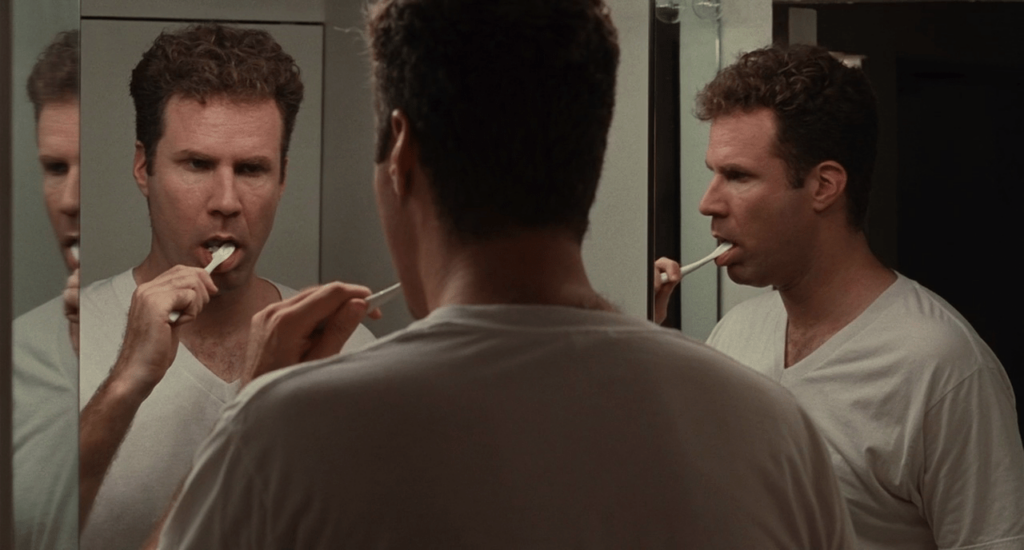Stranger than Fiction
directed by Marc Foster
Columbia Pictures
Will Ferrell stars as Harold Crick, Internal Revenue Service auditor, in the surprising Stranger than Fiction, an unexpectedly delightful film that brings whimsy and grown-up humor back to the movies. Harold Crick is a notable departure from the over-the-top roles that last year made Ferrell the highest-paid actor in Hollywood. His commercial success proves that even in show business nice guys can finish first.
The benign spirit that inhabits the many comic personas Ferrell brought to life during his seven seasons (1995–2002) on Saturday Night Live sets him apart from his peers, even though this spirit was most apparent when his skits bombed. Ferrell did the required Saturday Night Live impersonations, most famously of George W. Bush. For those of us who came under the spell of his Bush impressions it would forever after seem that the president had become the Ferrell caricature of him. But if there was ridicule in Ferrell’s impersonations, there was never malice, and if his comedy was over-the-top, he never crossed the line—as so many desperate comic actors do—from good humor to bad taste.
Most of Ferrell’s movie roles were obvious spinoffs of Saturday Night Live performances—Frank Ricard in Old School, Buddy in Elf, and Ricky Bobby in Talladega Nights (which he co-wrote). Woody Allen recognized that there was more to Ferrell when he cast him in his tragicomedy Melinda and Melinda, in the role a younger Allen would have played himself. Ferrell is six foot three, and there is no resemblance between this gentle giant and the tortured Allen; nonetheless, there were moments when viewers saw Woody Allen’s familiar expressions moving across Ferrell’s face: he was still impersonating. For comic actors like Ferrell, who hide so well behind impersonations, letting go and exposing their unguarded self to the camera is the greatest challenge. In Stranger than Fiction, Ferrell achieves this. The French have an expression for the Will Ferrell we are now allowed to see: “Bon comme du bon pain”—as good as good bread.
Zach Helm, who wrote the screenplay, began, as they say in Hollywood, with a premise. Imagine that one day the little voice you sometimes hear in your head turns into a narrator, the omniscient third-person narrator of a traditional novel. Helm took this premise to the creative producer Lindsay Doran, who in 1995 had teamed up with Emma Thompson for the successful and award-winning adaptation of Jane Austen’s Sense and Sensibility. Doran liked Helm’s premise and challenged him to work it into a believable screenplay. And she brought Emma Thompson on board to play the novelist—Fay Eiffel—whose British-accented voice Harold Crick, and only he, begins to hear one day.
The plot centers on an ontological question: is Harold Crick a person with his own life to live, or a character in Fay Eiffel’s novel-in-progress, which will end as Eiffel plans—with his imminent death? In the world of the novel, Harold remains alive only because Eiffel is suffering from writer’s block. But in the beginning of the film neither Harold nor the audience is aware of the ontological problem. There is no explanatory scroll to prepare us for what follows, nor is the all-star cast—which also includes Maggie Gyllenhaal (Ana Pascal), Dustin Hoffman (Professor Jules Hilbert), and Queen Latifah (Penny Escher)—identified in advance.
We are thrown into the quotidian world of Harold Crick, man of routines, rituals, and numbers. There is a suggestion of Asperger’s Syndrome: Harold counts his toothbrush strokes, 40 up and down, 40 across. But Ferrell never lets Crick fall into Rain Man caricature. This particular morning his brushing routine is interrupted by the voice of the narrator, who seems to know it as well as Harold. He first thinks someone or some device is in the room with him. He then begins to worry that he is hallucinating. Harold’s daily reassuring routines—counting steps to his bus stop, doing complicated calculations in his head, working and taking breaks by the clock—are all interrupted and disturbed by the narrator’s commentary. Eventually he sees an unsmiling psychiatrist, Dr. Mittag-Leffler (Linda Hunt), who informs him that he is in fact hallucinating and diagnoses him as schizophrenic. When Harold insists that the voice belongs to a literary narrator and is not a garden-variety symptom of mental disorder, the psychiatrist relents and sends him to a professor of literary criticism, Jules Hilbert.
Hoffman seems to enjoy his part thoroughly, and the pleasure is contagious. His first step in solving the mystery is to figure out whether Harold is in a tragedy or a comedy. Hilbert’s definition of a comedy is a story in which two people who don’t like each other fall in love. Since there is no love relationship in Harold’s life, Hilbert warns him that he may be in a tragedy that will end, as all tragedies do, with death. Now in crisis, Harold sets out to change the storyline of his life. He has a comic prospect, a woman who hates him. Ana Pascal, played by the beguiling Maggie Gyllenhall, is an earth-mother type who dropped out of Harvard Law School because she only wanted to bake cookies. She now owns a bakery and has come to Harold’s professional attention because she withholds some of her income tax each year to protest the government’s military spending. Harold, a scrupulous IRS auditor, has no sympathy for such protests and no sense of humor about Ana’s casual bookkeeping. Ana clearly detests poor Harold; so now he needs to make her love him.
As unlikely as it seems, he wrenches himself out of the cage of his character and is about to win her love. Then, on a visit to Hilbert, he recognizes the voice of his narrator speaking on one of the professor’s old videos. He learns that she is Kay Eiffel, one of Hilbert’s favorite authors. This is terrible news, because Eiffel—according to Hilbert—only writes tragedies, and her protagonist always dies. Even worse, Harold soon learns, Eiffel’s publisher has recently sent her an assistant, Penny Escher (Queen Latifah), who is an expert in helping novelists overcome writer’s block. Unless Harold can stop Eiffel from finishing her book, his discovery of the joys of Eros will go for naught.
Harold tracks Eiffel down through her IRS records, and there is a marvelous encounter between the character and his creator. Emma Thompson milks every drop of emotion from this Galatea–Pygmalion moment. She hands over her only manuscript in a version that is complete except for the last sentence describing his death. He takes the manuscript unread to Hilbert who, after reading all night, proclaims it a masterpiece that requires Harold’s death. At last Harold confronts his fictional reality as a reader; he returns the manuscript to Eiffel accepting his death for the greater good of literature.
Then, in a final happy twist, Eiffel decides that a character like Harold deserves to live even if her novel must suffer. The ontological rigor of Harold’s ordeal collapses into this whimsical resolution. This is not the kind of “meta-film” that self-consciously uses the devices of literature or cinema to help us explore the illusory nature of reality or the ambiguous lines between brute experience and narrative memory. It takes a page from Pirandello’s Six Characters in Search of an Author, another from Woody Allen’s Purple Rose of Cairo, another from Charlie Kaufman’s Adaptation, and the borrowing goes on, not just from film sources but from history (consider the names of the characters). Stranger then Fiction is intellectually witty and playful, meant to amuse not to edify, and it succeeds as a film because the audience can only agree with Kay Eiffel’s verdict about the goodness of Harold Crick: wherever he exists, we care about him and need him around.








